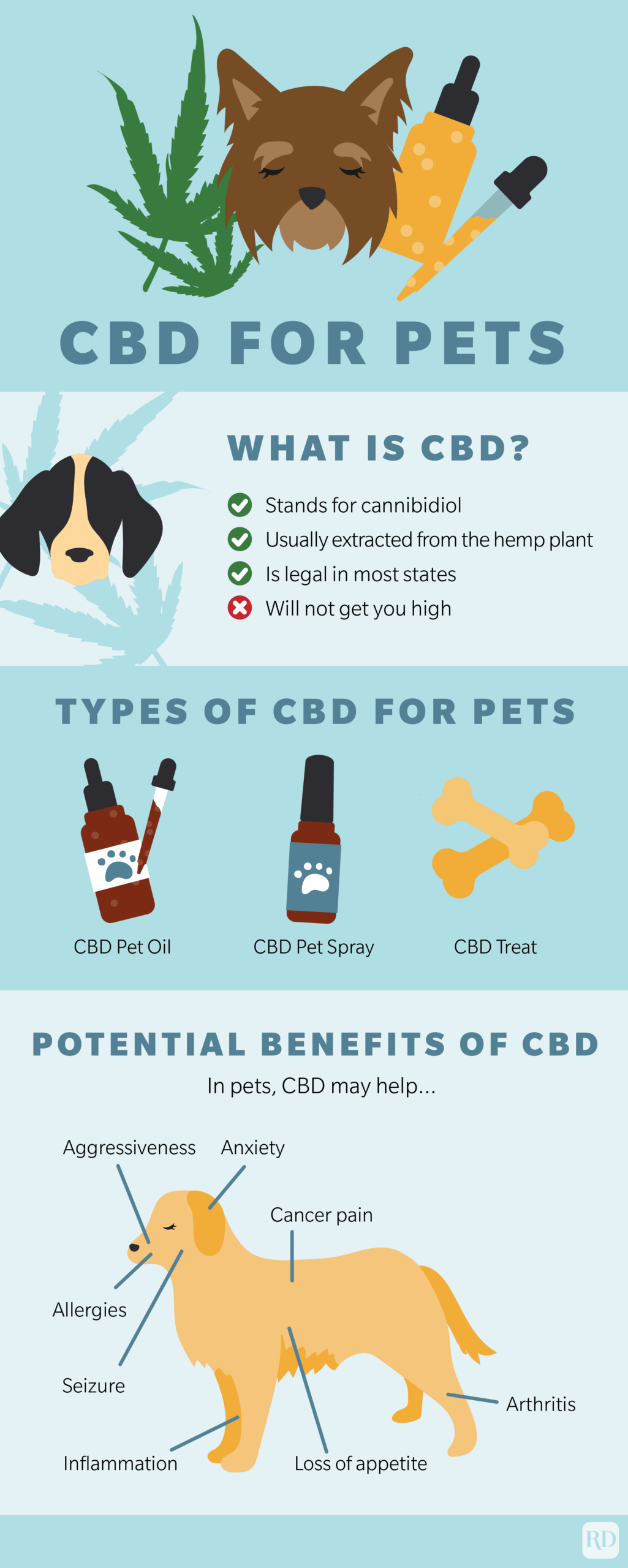13 Things to Know Before Giving CBD to Your Pet
Updated: Dec. 14, 2023

Just because CBD products are everywhere, it doesn’t mean they’re risk-free. Here's what you need to consider before buying one for your dog or cat.
The CBD market for pets has never been hotter. Not only has there been an explosion in CBD products for pets, but consumers are also warming up to the idea of giving these products to their cats and dogs for everything from anxiety to arthritis. According to a 2019 Packaged Facts survey, 11 percent of dog parents and 8 percent of cat parents have used CBD or hemp supplements with their pets.
While that may not sound significant, another survey conducted earlier that year found that interest in CBD products among pet parents was high. In this survey, 39 percent of dog parents and 34 percent of cat parents liked the idea of CBD supplements for their pets, with 29 percent saying they would use them if they were legal. (FYI, hemp-derived CBD products have been legal since 2018.) But before you give your cat or dog CBD, there are a few important things you should know, including whether CBD oil for dogs and cats is safe.

CBD in pet products can come from either cannabis or hemp
So, what is CBD oil, exactly? CBD stands for cannabidiol, and it’s a cannabinoid produced by a plant called cannabis sativa. There are two varieties of this plant species—one that produces cannabis, most commonly known as marijuana, and another that produces hemp. “The difference between these two plants is the amount of THC (the psychoactive compound in cannabis) in that plant at the time of harvest of dry weight matter,” says ReAnna Cornell, LVT, a Michigan-based senior veterinary cannabis counselor (VCC) for Veterinary Cannabis’ Consultation Service. While hemp will contain less than .3 percent THC, marijuana will have more, and marijuana has more risks to your pet than hemp.
Learn how CBD may help calm your pet’s anxiety, manage pain, and more with expert advice inside our all-new book, The Essential Guide to CBD.
Knowing where the CBD comes from matters
A product with CBD means nothing unless you know where that CBD comes from, and that’s key because of the potential of side effects. “As a general rule, hemp-based CBD products are safe,” says Gary Richter, DVM, medical director of Holistic Veterinary Care in Oakland, California, and author of The Ultimate Pet Health Guide. “While CBD products from marijuana (which contain THC) do have medical applications, even when combined with one another, potential risks are enormous.” Signs of THC toxicity start with lethargy and can progress to loss of balance and coordination, then losing consciousness, and in some cases, death, which is why Dr. Richter doesn’t recommend using these products without guidance.
Unless you’re in California, your vet can’t discuss or recommend cannabis products
Because marijuana is a Schedule 1 controlled substance, vets could be penalized and potentially lose their license for advising you about CBD products for your pet, Dr. Richter says. “That’s crazy because then where do you go for advice? The 15-year-old store employee?” he adds. The one exception is California, which recently became the first state to allow vets to discuss—but not recommend or prescribe—cannabis with their clients. It’s also important to note that the FDA hasn’t approved any CBD products for pets, which adds another layer of complication for vets and pet parents.
Studies on CBD in pets are limited
Currently, there are two published studies on CBD in pets, both of which focus on the effects of hemp-derived CBD on dogs. One looked at the use of CBD for canine osteoarthritis and the other for seizures, and both studies showed benefits, Cornell says. In the osteoarthritis study, published in Frontiers in Veterinary Science, CBD oil decreased pain and increased activity in dogs. Meanwhile, the second study from the Journal of the American Veterinary Medical Association showed that CBD reduced seizure frequency. Other studies are currently ongoing, so expect to see more data in the near future. For a firsthand account, read this story of one woman who believes CBD drops helped her dogs live longer.
The benefits for pets are similar to the benefits for people
The potential medical benefits for animals are the same as you would expect for people, Dr. Richter says. Think pain relief, anxiety management, seizure control, help with gastrointestinal issues, and cancer therapy. And here’s how CBD helped one cat’s lump disappear in less than two months. “You name it, and there’s potentially an application for it, as one of the upsides is that cannabis, when used properly, is safer than most pharmaceuticals,” he says. Side effects may include vomiting, lethargy, diarrhea, and loss of appetite, but can progress all the way to toxicity in rare cases.
CBD can be particularly helpful for pets with anxiety
If your cat or dog gets freaked by noise or turns into a nervous mess when going to the vet, CBD can help control that anxiety, especially when paired with behavioral modifications. This is even true for pets with severe anxiety. Cornell offers a personal example: Her dog was so severely anxious that she would freak even when she heard the stove being turned on. At the time, the vet told Cornell to consider euthanizing her dog, as there was no hope for her. Instead, Cornell put her dog on CBD, and she’s now thriving. It hasn’t been a cure-all, and her dog is still more anxious on some days than others, but her quality of life has improved immensely. Not quite ready to take the CBD plunge? Here are more ideas for calming an anxious dog.
Your vet needs to know if you’re giving CBD to your pet
Cannabis can adversely interact with certain drugs, which is why you need to tell your vet if your pet is taking CBD. “Certain components in cannabis are metabolized via certain pathways in the liver, which could be the way other medications are metabolized,” Dr. Richter says. That could make those medications less or more effective, leading to toxicity in some cases. “Just because cannabis is natural doesn’t make it harmless.” Your vet can always refer you to a VCC to discuss whether CBD is right for your pet.
Any CBD pet product you buy should have a COA
Cannabis is a remarkable plant in that it pulls toxins, molds, and heavy metals out of the ground, but that comes with a price. “Those could wind up in the CBD, which then makes its way into these products,” Cornell says. For instance, you could wind up with acetone (which is used in nail polish removers) in CBD. So before you buy any product, you should check that the company has a certificate of analysis (COA) for that product, which will tell you what the product has been tested for and how many cannabinoids it has. “It’s not cheap for companies to do testing, and because there’s no standardization, a company that’s willing to get this speaks volumes.” In fact, Cornell won’t even consider a product if the company can’t produce a COA. While you can usually find these on the company’s website, you may also have to contact the company to ask. Look for these warning signs that a CBD product is fake.
Pet products with CBD are everywhere, but it’s buyer beware
You can purchase a pet product with CBD almost anywhere, which Cornell calls scary. “Store employees don’t know what’s in these products, and you have to be careful because some do contain harmful additives like xylitol,” she says. Because there is no one-size-fits-all product for dogs and safety varies from product to product, you have to make sure the product has a COA to start. Then consult with a veterinary professional as an added precaution.
You need to check the COA every time you buy a product
So you’ve had luck using a particular product and you’re ready to order again. Do you really need to check for the COA if you did it the first time you purchased it? Yes. “By no fault of the company, there can be changes in each harvest,” Cornell says.
Giving the wrong product or the wrong dose could backfire
If you give the wrong product or dosage, you’ll likely not get the effect you were hoping for and assume the CBD didn’t work. “In reality, it could work great, but you just didn’t do it right, and thus, the animal suffers through a lack of effective treatment,” Dr. Richter says.
A good guideline: Start low and go slow. There are usually dosing instructions on packages, but because every animal is different, those instructions have little value. “If you don’t give enough, it won’t have any effect, but if you give too much, you could have side effects,” Cornell says. “Instead, you need to dose to effect, and the best way to do that is by giving too little to start and progressing slowly.”
You need to monitor your pet
Whenever you give your pet something new, you need to monitor their behavior, and with possible side effects from CBD, that’s even more important, Cornell says. For instance, after giving CBD, do you notice that your pet’s stools have changed? Have your pet’s eating habits changed? This will also tell you whether the dose you’re using is effective or not, which is why Cornell advises keeping a journal. Write down what you give your pet, how much you’ve given and when you’ve given it. Then note any changes in your pet.
Tinctures hold an edge over treats
There are certain advantages to tinctures, namely that they let you dose a precise amount. “You can see how many drops you’re giving a pet, and you know how much is in one drop,” Cornell says. Meanwhile, chews have other ingredients in them and take longer to absorb because they have to be digested in the stomach. Still, see what works for your dog. This couple, for example, found that CBD treats worked better to calm their dog’s anxiety.
Sources:
- Packaged Facts: “Dog and Cat Owners High on CBD Products in $7 Billion Pet Treats Market”
- Packaged Facts: “Pet Parents Embrace CBD Products in Growing Pet Supplements Market”
- ReAnna Cornell, LVT, a senior veterinary cannabis counselor for Veterinary Cannabis’ Consultation Service
- Gary Richter, DVM, medical director of Holistic Veterinary Care
- Frontiers in Veterinary Science: “Pharmacokinetics, Safety, and Clinical Efficacy of Cannabidiol Treatment in Osteoarthritic Dogs”
- Journal of the American Veterinary Medical Association: “Randomized blinded controlled clinical trial to assess the effect of oral cannabidiol administration in addition to conventional antiepileptic treatment on seizure frequency in dogs with intractable idiopathic epilepsy”










